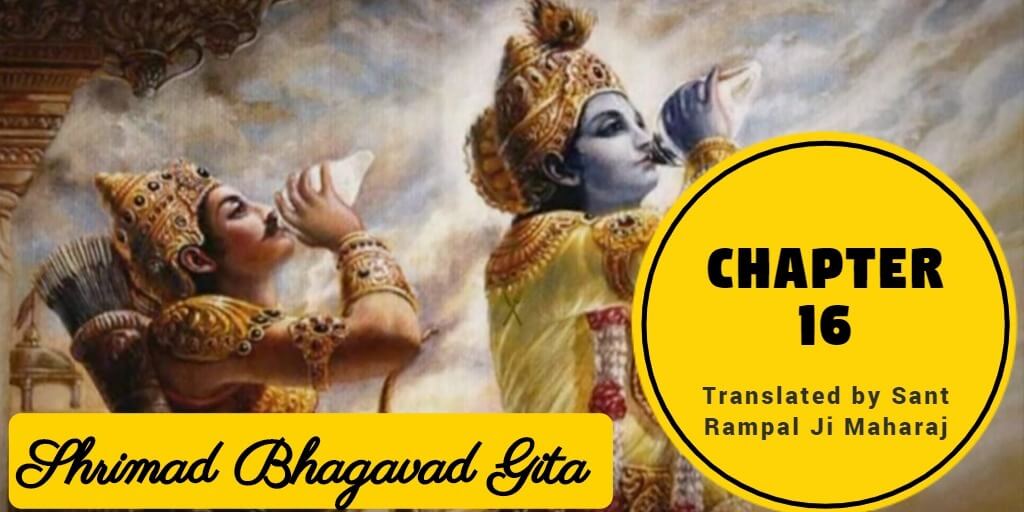
Main Verses of Shrimad Bhagavad Gita Chapter 16
Saint Rampal Ji Maharaj has done a translation of Shrimad Bhagavad Gita Chapter 16 that describes individuals who are divine and demoniac. It says that the arbitrary worship opposed to scriptures is useless and the soul remains in the trap of 84 lakh different life species. People with saintly nature attain liberation after chanting Satnaam and Sarnaam obtained from a Tatvadarshi sant.
Shrimad Bhagavad Gita Chapter 16 Verse 1-3
Description of Individuals with Divine and Demoniac Nature
Important: In Bhagavad Gita Chapter 16 from Verse no. 1 to 3, the characteristics of those pious souls have been mentioned who, in previous births, used to do Brahm sadhana by reciting OM Naam according to the Vedas i.e. in accordance with the scriptures due to which they used to relish pleasure for some time in Brahmlok then again get human birth and used to do bhakti of Purna Parmatma after obtaining it from a Tatvadarshi sant, and who could not get across (liberate). When they again obtain a human birth, then they possess the following characteristics.
In Bhagavad Gita Chapter 16 Verse 1 to 3, God Brahm (Kaal) describes the divine nature (of noble souls). They are fearless, unhostile, observe religious practices, are soft-spoken, do not criticize anyone, they are not lascivious, angry, greedy, and arrogant. They do not ask to get honored by anyone. They are modest. They donate, do swaadhyaH, Yagya, etc. Because they are doing bhakti since their previous births, that is why their nature is like that of godly men i.e. saints.
Special: In the original Chapter in this Verse No. 1 the meaning of the ‘Tap’ word does not mean severe austerity. The difficulty that is faced in performing scriptures-based worship is called ‘Tap’. Like, the seeker who performs scriptures based worship has to abandon the unscriptural practice. The people of that community strongly oppose to which that seeker belongs. To face that opposition and follow ‘Swadharma’ is called ‘Tap’.
Shrimad Bhagavad Gita Chapter 16 Verse 4
In Bhagavad Gita Chapter 16 Verse 4, it is described that those men who have hypocrisy, arrogance, anger, harshness, and ignorance are demoniac who have been born with demoniac instincts i.e. those souls did not get the company of saints in their births. They, abandoning the ordinances of the scriptures, kept behaving arbitrarily i.e. kept worshipping other gods (Rajgun-Brahma, Satgun-Vishnu, Tamgun-Shiv, ghosts-pitras, Goddess, and bhairavon, etc). Even when they attain a human birth, then also they keep doing sadhana based on their previous temperament. As a result of which, they did not possess high opinions.
Shrimad Bhagavad Gita Chapter 16 Verse 5
In Bhagavad Gita Chapter 16 Verse 5, it is stated that those people who have saintly nature are born for attaining liberation by doing bhakti. If one gets a Complete Saint Guru, then liberation is possible; if one does not get a Complete Guru (who gives Satnam and Saarnaam) then by following the incorrect way of worship, his life will go in vain. And those who are demoniac they do not do bhakti. Even when they do bhakti, it is opposite to the ordinances of the scriptures and is fraudulent based on lokved, alongside continue to indulge in evil habits (consumption of tobacco, meat, and alcohol); if they do not indulge in evil habits, then also remain firm in the worship of other gods. If someone tries to guide them, then they become angry. They become bound in the bondage of inauspicious actions i.e. are entangled in the bondage of 84 lakh births. Arjun! You are born with saintly nature. Therefore, do not worry.
Shrimad Bhagavad Gita Chapter 16 Verse 6
In Bhagavad Gita Chapter 16 Verse 6, it is stated that in this world there are groups of two types of people. One of saintly nature and the other of the demoniac. The characteristics of those with saintly nature have been described above (in Verses 1, 2, and 3) in detail. Now hear about the characteristics of those with demoniac nature.
Shrimad Bhagavad Gita Chapter 16 Verse 7
In Bhagavad Gita Chapter 16 Verse 7, has said that demoniac people do not even know what to do and what to refrain from. Neither do they have purity in them, nor have good conduct, and also do not know the truth.
Shrimad Bhagavad Gita Chapter 16 Verse 8
In Bhagavad Gita Chapter 16 Verse 8, it is explained that they, with demoniac nature, say that the world is baseless, unreal, and without God and that it is self-generated (by the union of male-female). Only sex (Kaam) is its cause.
Shrimad Bhagavad Gita Chapter 16 Verse 9
In Bhagavad Gita Chapter 16 Verse 9, it is said that the people with demoniac nature, who follow this false and baseless knowledge, the disgraceful souls, are dim-witted, they harm others, perform cruel deeds, and are born for the destruction of the world.
Shrimad Bhagavad Gita Chapter 16 Verse 10
Bhagavad Gita Chapter 16 Verse 10: Those with demoniac nature, filled with hypocrisy, pride, arrogance, driven by insatiable desires, out of delusion acquire false principles, and wander about adopting corrupt behavior.
Shrimad Bhagavad Gita Chapter 16 Verse 11
In Bhagavad Gita Chapter 16 Verse 11, it has been explained that the nature of those individuals with demoniac temperament does not even end after death. Obsessed with innumerable anxieties, who remain engrossed in worldly enjoyments, who are convinced that only this is happiness.
Shrimad Bhagavad Gita Chapter 16 Verse 12
In Bhagavad Gita Chapter 16 Verse 12, it is said that those with demoniac nature, whether they are called saints, whether their disciples or people who themselves perform baseless sadhana are bound by hundreds of shackles of desires, overpowered by lust and anger strive to collect wealth by unjust means for indulging in sensual pleasures, and also do bhakti opposite to the ordinances of the scriptures.
Shrimad Bhagavad Gita Chapter 16 Verse 13
The purport of Bhagavad Gita Chapter 16 Verse 13 is that those with demoniac nature say, “Today I have acquired more money. I will do this, I will attain that, I have so much wealth, and in future, I will have even more.”
Shrimad Bhagavad Gita Chapter 16 Verse 14
The meaning of Bhagavad Gita Chapter 16 Verse 14 is that those men with demoniac disposition say, “Those enemies have been killed by me. I will also kill those other enemies. I am God. I am the Doer. I am perfect, powerful, and happy”.
Shrimad Bhagavad Gita Chapter 16 Verse 15, 16
Bhagavad Gita Chapter 16 Verse 15, 16: Those with demoniac nature say that I am very wealthy and of a noble/great family. Who else is equal to me/ I will perform Yagya, will do charity and will rejoice. Thus, deluded by ignorance, with the perplexed mind, entangles in the snare of delusion, excessively addicted to sensual enjoyments (the demoniac people) fall into deep impure hell.
Shrimad Bhagavad Gita Chapter 16 Verse 17 - 20
The meaning of Bhagavad Gita Chapter 16 Verse 17 to 20 is that those who follow the arbitrary way of worship which is opposite to the ordinances of scriptures {to worship the three Gunas; Rajgun-Brahma, Satgun-Vishnu, Tamgun-Shiv, and other lower gods, to worship Pitras (to carry out shraadhs), ghosts (to offer pind, to perform terahveen-satarhveen [the thirteenth day and the seventeenth day after death – when the last funeral rites are performed]), to collect ‘phool’, ashes of a cremated person, and to take to Ganga for scattering and performing last rites, etc are religious practices opposite to the scriptures. Evidence is in holy Bhagavad Gita Chapter 7 Verse 12 to 18 and 20 to 23, and Bhagavad Gita Chapter 9 Verse 22 to 25.}, the sinners, self-conceited, who criticize each other, who violate my orders, who perform cruel deeds, the most degraded among men, I hurl them repeatedly into the wombs (births) of demons. Those fools, instead of attaining me i.e. instead of going into my great heaven (which is built in Brahmlok), after enjoying the short-lived happiness in heaven, etc. go to a further lower state i.e. fall into deep hell.
Shrimad Bhagavad Gita Chapter 16 Verse 23-24
Related to this is mentioned in Gita Chapter 16 Verse 23-24 that he who, abandoning the ordinances of the scriptures, acts whimsically i.e. performs arbitrary way of worship, neither attains happiness, nor is his any task accomplished, and nor attains supreme salvation. Therefore, Arjun, scriptures are the only evidence for the religious practices which should be done and which should not be done in the path of bhakti. One should not accept the path of bhakti, which is against the scriptures, directed by any other particular type of person or saint-sage.
Shrimad Bhagavad Gita Chapter 16 Verse 21, 22
Those Indulging in Evil habits Cannot Do Bhakti
The purport of Bhagavad Gita Chapter 16 Verse 21, 22 is that lust, anger, and greed - lead a living being to the gate of hell. Only those who are free from these can attain supreme salvation (complete liberation); otherwise not.
Kabir Sahib also gives evidence –
Kabir, kaami krodhi laalchi, inse bhakti na hoye |
Bhakti kare koii soorma, jaati varan kul khoye ||
Shrimad Bhagavad Gita Chapter 16 Verse 23, 24
Way of Worship Opposed to Scriptures is Useless
In Bhagavad Gita Chapter 16 Verse 23, 24, it is stated that those who abandoning the ordinances of scriptures follow the way of worship according to their whimsical desires {worship of the three Gunas, Rajgun-Brahma, Satgun-Vishnu, Tamgun-Shiv, and other gods-goddesses, idol-worship, Pitra-worship, ghost-worship – to carry out shraadhs – offer pinds, worship of place of pilgrimage, circumambulation of Govardhan, to visit places of pilgrimage, to practice austerity, worship of Peepal-Jaanti, Tulsi, Jaap of Naam without a guru, Yagya, to give charity, goddess of Gurgaon, of Beri, of Calcutta, worship of Mata of Seenk Paathri, worship of tomb, Guga peer, baba of Johad (small lake), worship of a date (to keep fast of any type), worship of Baba Shyaam Ji and worship of Hanuman, etc. is known as ‘opposed to scriptures’} neither can they become happy, nor attain liberation. Therefore, Arjun! perform those actions which should be done according to the ordinances of the scriptures. For you, the scriptures are the only evidence. A wrong way of worship, instead of being beneficial, is harmful. Search for the Tattavdarshi Saint who instructs the true way which is in accordance with the injunctions of the scriptures. By doing bhakti only the Purna Parmatma, you will attain eternal peace, all the happiness, and supreme salvation. (There is special evidence in Bhagavad Gita Chapter 18 Verse 62, Bhagavad Gita Chapter 15 Verse 1 to 4, and Bhagavad Gita Chapter 4 Verse 5).
Kabir Saheb Ji has said that
Kabir, eke sadhe sab sadhe, sab sadhe sab jaae |
Malee seenche mool kun, phale phule aghaye ||
Conclusion: The above explanation of all Verses of Bhagavad Gita Chapter 16 has been done by great Tatvadarshi Sant Rampal Ji Maharaj. This chapter provides a description of individuals with divine and demoniac nature. It has been stated that people with saintly nature are born for attaining liberation by doing true worship told by the complete saint. People with demoniac nature say that ‘the world is baseless, unreal, and without God, it is self-generated. Such demoniac is dim-witted and is born for the destruction of the world and their behavior does not end even after death. It is stated that those who perform an arbitrary practice that is devoid of the injunctions of scriptures remain in the vicious cycle of birth-death and suffer in 84 lakh life births. Those who indulge in evil habits cannot worship. The above explanation of all Verses of Bhagavad Gita Chapter 16 has been done by great Tatvadarshi Sant Rampal Ji Maharaj.
